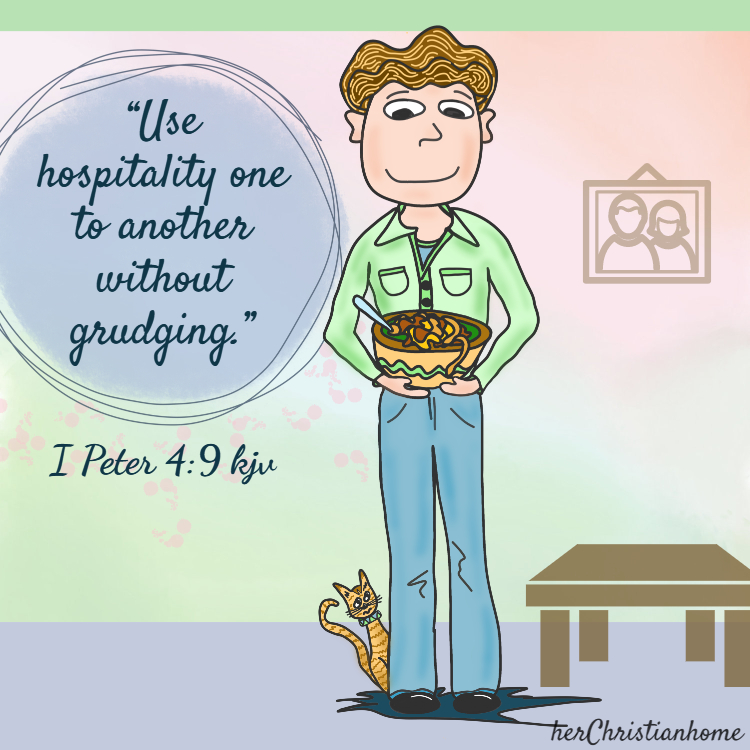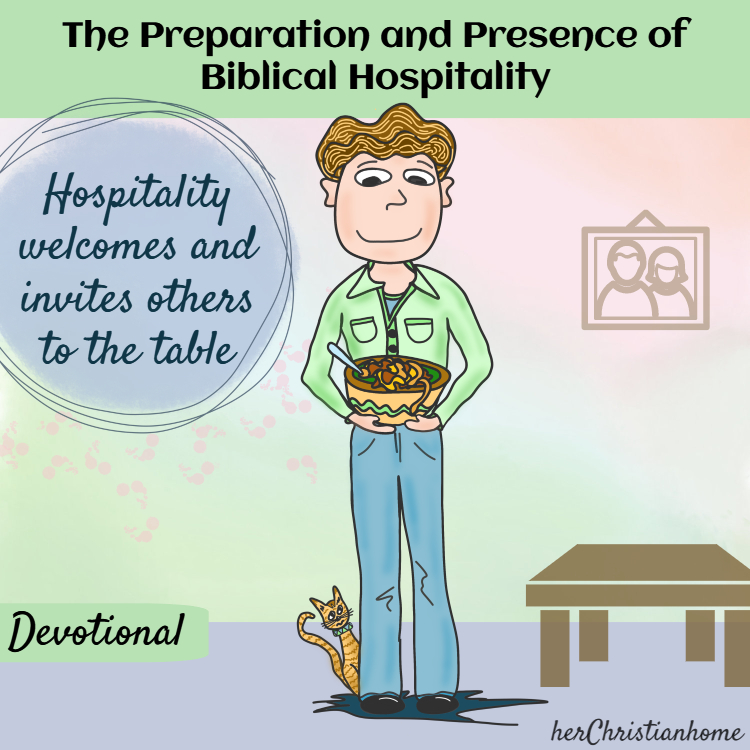This is a guest post by Jamie Lamson
Biblical hospitality is a virtue that has grown in my heart over the past couple of years. As I began fostering a nurturing and welcoming environment for my husband and children, I have noticed that my home has evolved into an open door and a seat at my table for anyone Jesus would bring my way.
When I think about biblical hospitality, I am instantly reminded of Mary and Martha, the sisters from Bethany (Luke 10:38 to 42). Both have unique strengths and visions, and I believe that we, as believers, can relate to either sister in some form or capacity.
Both women recognized that Jesus was important. And they wasted no time in welcoming Him into their home.
Both women were attentive to their guest of honor. While Martha was proactive with keeping a hospitable environment and preparing nutritious sustenance for her guests, Mary intentionally focused on what was most valuable, Jesus.
I don’t believe it is one or the other; I wholeheartedly understand that there is tension in walking the fine line of preparation and presence with biblical hospitality. We simply can’t have one without the other, and if our hospitality is not balanced, then we open the door for bitterness to sneak in.

1 Peter 4:9 (KJV) says, “Use hospitality one to another without grudging.”
I don’t know about you, but I often find my thoughts partnering with irritability and resentment when I feel that I am either taking on most if not all the work of hosting, or if I am underprepared in my planning.
So, let’s unpack a few things to prayerfully consider when opening our homes and hearts to others…
1. Sharing a meal
Breaking bread with one another is biblical and builds trust between friends, family, and strangers. We see Jesus performing miracles in many settings with a feast, celebration, or even a simple meal presented. Sharing a meal opens our hearts for conversation and nourishment, both physically and emotionally.
When I sit down to a meal with someone, I am communicating that I feel safe with them and showing them that I am a safe place where they can refuel and genuinely be themselves.
2. Everyone is welcome
One verse that I learned early on in life and still meditate on to this day is found in Luke 10:27.
“Thou shalt love the Lord thy God with all thy heart, and with all thy soul, and with all thy strength, and with all thy mind; and thy neighbor as thyself.”
This is the most important thing we are to remember as followers of Christ; Love God with everything, and love others with His perfect love.
Jesus was such an incredible example of what it meant to love others. He welcomed men and women to the Father, and regardless of their past and even their present lives, He never pushed anyone away.
Jesus met people where they were, and while they often searched for Him, He equally sought others out. If anyone was hungry or thirsty for more than what this earth offered, He extended the Manna of Heaven and the Living Water. It was available to any and everyone who asked for it.
Hospitality welcomes and invites others to the table, regardless of their status, race, class, or social situation. It offers a chair to those who are tired, hurting, or ashamed.
3. A house is not a home
When I talk about where my family lives, I don’t refer to it as a house, but instead, I call it a “home”. And while these two words are similar, they have such diverse meanings.
A house is a building where people live, whereas a home is a place where people can flourish and thrive.
By inviting others into our home, we are living out the Gospel of Jesus Christ. Not only are we stewarding the provisions that God gave us by sharing them with others, but we are building relationships through His perfect love. When we open our homes to others, we are not only inviting them into our family setting, but we are showing them that they belong.
The Father invites us into His family through the hospitality of the Cross. He extends the invitation of His Son so that we would be welcomed into heaven as we accept the gift of eternal life.
When others accept our invitation to share a meal, by the power of His Spirit, we are able to extend His gift to those at our table.
Our earthly table is a reflection of God’s acceptance, forgiveness, mercy, and love. Will you pull out a chair?
4. Prepare and be present
So, how can you be hospitable while leaving stress at the back door? It comes down to planning well and focusing on what matters.
A few tangible ways I have learned to plan well is to:
- Set a date and time. While I like the excitement of being spontaneous, I also thrive on having things planned out in my calendar. When I am intentional about setting times and dates to open my home to others, I am less likely to cancel or even let months accidentally go by without doing so. Also, if you are an introvert like me, informing your guests of a start and end time will relieve anxiety around your meet-up.
- Plan a menu. Sometimes being hospitable involves you cooking a meal for others. While other times, it is simply asking each person to bring a dish to share or brewing a pot of coffee to sip at your table. Either way, when you open your home for fellowship, you are still ushering in the Gospel of Jesus.
- Discussion topic. Usually, when I invite others in, I like to include a space for an interactive devotional or a roundtable of heart discussion. This usually looks like taking turns to share how God is speaking in our individual lives or discussing a social challenge while aligning it with Scripture. By loosely planning a topic to discuss, I invite the Father to do whatever He wants.
Along with this, I also try to remember that for anyone to thrive in a relationship, they need to know that they are seen and heard. By giving my guests space to talk and process what they need to with minimal interruptions, I am expressing that what they have to say is meaningful. This also allows me to invite the Holy Spirit to use me to minister to them in a way that would be most impactful.
As we surrender our hearts, we can be good stewards of what God has given us while being vessels of His light and love. And as we practice biblical hospitality, we are walking out the Kingdom of Heaven.




